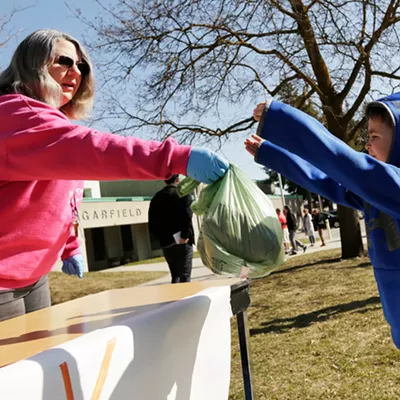Flawed Records
Laurie Rogers has been a long-time critic of Spokane Public Schools. She doesn't like the way math is taught. She doesn't like the adoption of Common Core standards. She wrote an entire book called Betrayed: How the Education Establishment has betrayed America and what you can do about it.
And now, the district that she has been so frustrated with has agreed to pay her $130,000.
Rogers had sued Spokane Public Schools, accusing it of failing to respond correctly to a 2011 public records request. And the district realized she was right and needed to pay her.
Mark Anderson, associate superintendent, says the district learned they made several mistakes, including incorrectly redacting personal email addresses, failing to include an index explaining every redaction and omitting requested district emails before 2008.
In response to the challenge of increasing records requests, Anderson says the district's hired a staffer with more experience dealing with records requests. It's also created a committee to look at other ways to make records more requests more efficient.
This past legislative session, Spokane Public Schools supported a bill that would have allowed a Superior Court to reject certain records requests and would have placed restrictions on the amount of time that public agencies could spend fulfilling such requests. The intent of the district's support for the bill, Anderson says, was not to limit transparency. It was to figure out a way to address the balloning cost. Last year, he says, the district spent $350,000 dealing with records requests.
— DANIEL WALTERS
Under Fire
A 28-year veteran of the Spokane Fire Department has filed a $2.5 million claim against the city alleging unlawful retaliation in the wake of his recent termination over accusations he threatened a fellow firefighter via email and violated city weapons policies.
City officials announced the firing of Capt. Kevin Smathers last week, alleging Smathers sent a threatening message to an SFD lieutenant over his personal email. A six-month internal investigation determined Smathers had also violated city policies by keeping a set of brass knuckles in his work vehicle and three city-owned firearms in a personal safe.
Attorney Bob Dunn, who has handled several termination lawsuits against the city, is representing Smathers. Dunn describes Smathers as a highly decorated employee facing "payback" for previously reporting the lieutenant's driving under the influence.
Dunn calls the allegations "bogus," arguing Smathers made no threat of violence in his email message and never violated any specific regulations. An arbitration hearing may be pending on the matter, Dunn says. The city has not yet filed a response to the retaliation claim.
— JACOB JONES
Carbon Control
To get the state closer toward meeting an ambitious set of goals aimed at curbing greenhouse gas emissions, Washington Gov. Jay Inslee said he would support a statewide "carbon cap and trade" system at a meeting Monday with the bipartisan Climate Legislative and Executive Workgroup.
A cap and trade system gives businesses a financial incentive to reduce their carbon emissions below state limits by allowing them to trade or sell any unused pollution "credits."
"My preference at the moment is to have an economy-wide cap on emissions and use market-based mechanisms to distribute that allocation right for the emissions," Inslee told the Olympian. "I think it's a preferable way because it combines the certainty of the cap or an absolute limit with using the market as the most efficient way to address where the allocation of the emissions are.''
Among Inslee's other suggestions to fight global warming were policies limiting the carbon content of transportation fuels, plans to phase out coal-fired power plants, a push for energy efficient construction, and potential pilot programs to modernize the state's transportation system.
In 2008, the Washington Legislature adopted targets requiring the state to cut global warming-producing gases by 2020, 2035 and 2050. A final report from the workgroup concluded that the state won't meet its benchmarks with current state and federal policies in place.
— DEANNA PAN



























